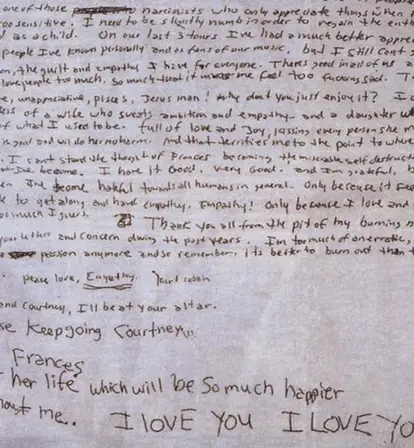Kurt Cobain's suicide note has fueled conspiracy theories since his 1994 death. Read the full text of it here, and decide for yourself what happened to the Nirvana frontman.
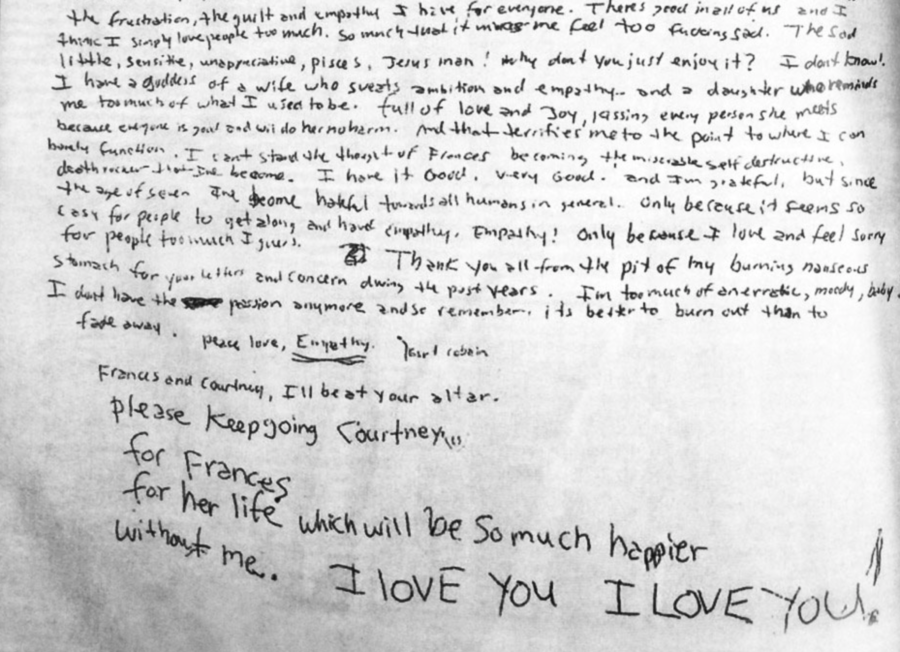
Public DomainAn excerpt of Kurt Cobain’s suicide note — read the full text below — found near his body inside his Seattle home on April 8, 1994.
On April 5, 1994, music icon Kurt Cobain died by suicide inside the greenhouse above the garage at his Seattle home at the age of just 27. When the investigation began once his body was found three days later, police found heroin, cigarettes, a shotgun, and Kurt Cobain’s suicide note.
Both in the immediate aftermath of his death and in the decades since, Kurt Cobain’s suicide note has become an essential touchstone for his friends, family, and fans as a way to understand what he was going through in those tragic final moments and why he chose to end his life.
“It’s better to burn out than to fade away,” Kurt Cobain’s suicide note famously read. And while this says a lot about the person his loved ones knew him to be, it also proved to have darker implications for those who didn’t know him so well, even if they felt like they did. In fact, some fans took those words as a rallying cry of a troubling sort. Indeed, it only took a couple of days for the first fan of Cobain’s to follow in his footsteps and kill himself.
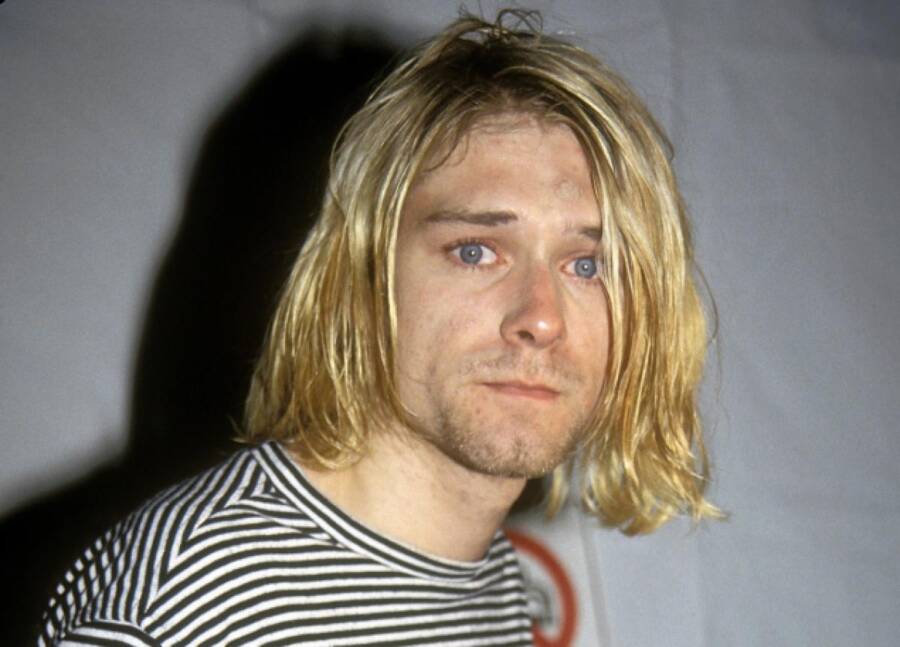
Vinnie Zuffante/Getty ImagesKurt Cobain attending the 1993 MTV Video Music Awards the year before his death in April 1994.
Similarly troubling are the theories surrounding Kurt Cobain’s suicide note, one claiming that it was actually an unfinished draft meant for his band — a breakup note, of sorts, that would signal the end of Nirvana and a new direction for his music career. Others even claim that Kurt Cobain’s suicide note was forged by none other than his own wife, Courtney Love, and that he was actually murdered.
But fringe theories aside, the poignant emotions of Kurt Cobain’s suicide note and of course the tragedy of his death remain just as powerful today as they did at the moment of the music legend’s untimely demise.
Go inside the full text of Kurt Cobain’s suicide note, the story behind it, and how it’s reverberated through the decades.
A Closer Look At Kurt Cobain’s Suicide Note And What It Says
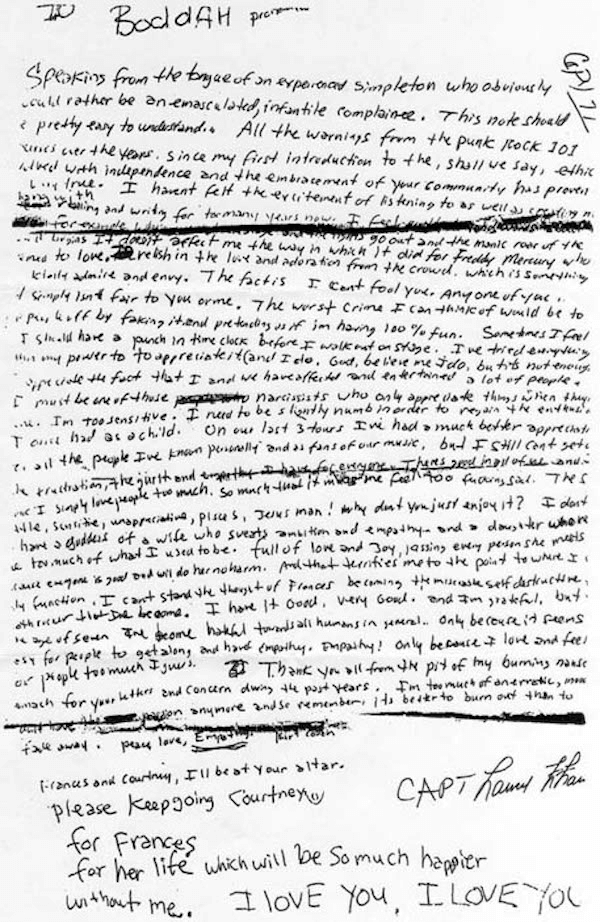
Public DomainKurt Cobain’s suicide note. Read the full text below.
Kurt Cobain overdosed on champagne and Rohypnol in a hotel room in Rome a month before his body was found in his Seattle greenhouse. He swallowed 50 pills and left behind a note. The incident was initially portrayed as an accident by his management team but was later revealed to be an attempted suicide which Cobain himself denied.
“A note was found,” Courtney Love’s manager Janet Billig said at the time, “but Kurt insisted that it wasn’t a suicide note. He just took all of his and Courtney’s money and was going to run away and disappear.”
It’s unclear whether this was the same note found at the scene of Cobain’s eventual suicide. Regardless, at the time of this earlier attempt Love made sure to let everyone know her husband wasn’t going anywhere.
“He’s not going to get away from me that easily,” she said. “I’ll follow him through hell.”
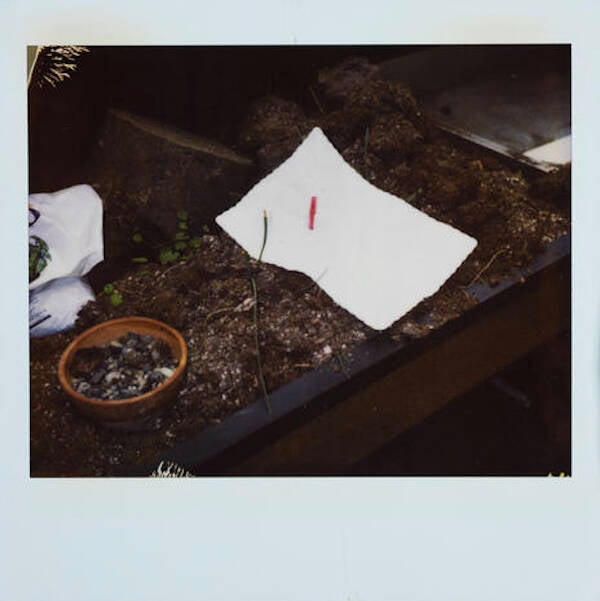
Seattle Police DepartmentKurt Cobain had been hiding in his greenhouse for several days, but nobody thought to check there until it was too late.
After a couple of days in a California rehab center, Cobain told the staff he was stepping outside for a smoke. He scaled the six-foot brick wall and flew back home to Seattle before his wife could cancel his credit cards.
Love hired private investigator Tom Grant to find her husband, while Cobain’s mother Wendy O’Connor issued a missing person’s report. Though his home was searched, nobody thought to look inside his garage or the greenhouse above it.
It’s uncertain what exactly happened between April 4 and April 5 except that Kurt Cobain likely propped a stool up against the greenhouse’s French doors and stayed inside, doing drugs, possibly writing or finishing the infamous note, and finally, shot himself, leaving a tragic note behind.
Kurt Cobain’s suicide note reads:
“To Boddah
Speaking from the tongue of an experienced simpleton who obviously would rather be an emasculated, infantile complain-ee. This note should be pretty easy to understand.
All the warnings from the punk rock 101 courses over the years, since my first introduction to the, shall we say, ethics involved with independence and the embracement of your community has proven to be very true. I haven’t felt the excitement of listening to as well as creating music along with reading and writing for too many years now. I feel guilty beyond words about these things.
For example, when we’re back stage and the lights go out and the manic roar of the crowds begins, it doesn’t affect me the way in which it did for Freddie Mercury, who seemed to love, relish in the love and adoration from the crowd which is something I totally admire and envy. The fact is, I can’t fool you, any one of you. It simply isn’t fair to you or me. The worst crime I can think of would be to rip people off by faking it and pretending as if I’m having 100% fun. Sometimes I feel as if I should have a punch-in time clock before I walk out on stage. I’ve tried everything within my power to appreciate it (and I do, God, believe me, I do, but it’s not enough). I appreciate the fact that I and we have affected and entertained a lot of people. It must be one of those narcissists who only appreciate things when they’re gone. I’m too sensitive. I need to be slightly numb in order to regain the enthusiasms I once had as a child.
On our last 3 tours, I’ve had a much better appreciation for all the people I’ve known personally, and as fans of our music, but I still can’t get over the frustration, the guilt and empathy I have for everyone. There’s good in all of us and I think I simply love people too much, so much that it makes me feel too fucking sad. The sad little, sensitive, unappreciative, Pisces, Jesus man. Why don’t you just enjoy it? I don’t know!
I have a goddess of a wife who sweats ambition and empathy and a daughter who reminds me too much of what I used to be, full of love and joy, kissing every person she meets because everyone is good and will do her no harm. And that terrifies me to the point to where I can barely function. I can’t stand the thought of Frances becoming the miserable, self-destructive, death rocker that I’ve become.
I have it good, very good, and I’m grateful, but since the age of seven, I’ve become hateful towards all humans in general. Only because it seems so easy for people to get along that have empathy. Only because I love and feel sorry for people too much I guess.
Thank you all from the pit of my burning, nauseous stomach for your letters and concern during the past years. I’m too much of an erratic, moody baby! I don’t have the passion anymore, and so remember, it’s better to burn out than to fade away.
Peace, love, empathy.
Kurt CobainFrances and Courtney, I’ll be at your alter.
Please keep going Courtney, for Frances.
For her life, which will be so much happier without me.
I LOVE YOU, I LOVE YOU!”
Interpreting The Tragic Text Of Cobain’s Suicide Letter
Kurt Cobain’s suicide note was addressed to his childhood imaginary friend, Boddah. The note was written in red ink, the pen he presumably used was stabbed through the center of the note in a flower box inside the greenhouse. Several sentences were crossed out and the handwriting seems to become hastier and erratic in the second half.
According to Charles R. Cross’ definitive biography on Cobain, Heavier Than Heaven, Boddah became one of figures of refuge for a young Cobain. With his parent’s divorce and the dissolution of his family as he knew them, Cobain must have sought peace in Boddah.
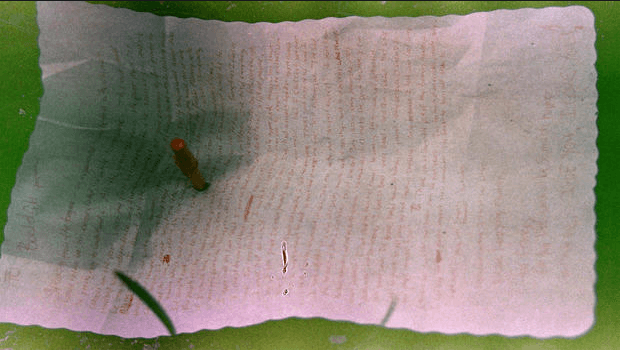
The handwriting at the end of Kurt Cobain’s suicide note appears sloppier and more hectic than that in the beginning. Some think that this indicates foul play.
The fact that Kurt Cobain’s suicide note was addressed to Boddah could mean that the singer felt nobody else in his real-world ever understood him. It could also mean that nobody could have written the note as who else would be privy to such an intimate aspect of Kurt Cobain’s childhood?
“As he wrote, the illumination from MTV provided most of the light, since the sun was still rising,” Cross posited in his book. “When he put the pen down, he had filled all but two inches of the page. It had taken three cigarettes to draft the note.” Then Cross added, “It was getting brighter outside and he needed to act before the rest of the world woke.”

THERESE FRARE/AFP/GettyImagesA police officer stands guard outside of the greenhouse where Kurt Cobain’s body was found. Fans and reporters soon arrived to find answers. April 8, 1994. Seattle, Washington.
Cross posits that right before he shot himself, Cobain added in the last few lines of his suicide note, which would account for their sloppiness.
After smoking his last cigarette and loading the shotgun, Cobain used half of his last Mexican black tar heroin (about $50 worth) and injected himself right above his “K” tattoo. Finally, as he drifted off — before it was too late — he put the barrel against the roof of his mouth.
“He rose from the bed and entered the closet,” Cross wrote, “where he removed a board from the wall. In this secret cubbyhole sat a beige nylon gun case, a box of shotgun shells, and a Tom Moore cigar box. He replaced the board, put the shells in his pocket, grabbed the cigar box, and cradled the heavy shotgun over his left forearm. In a hallway closet, he grabbed two towels; he didn’t need these, but someone would. Empathy.”
With that, Kurt Cobain pulled the trigger, ending his life at the age of 27. Soon, as friends, family, and fans around the world tried to deal with this horrifying news, Kurt Cobain’s suicide note would provide some insight into what he was feeling in his final moments and why he killed himself.
Was Kurt Cobain’s Suicide Note Forged?
Kurt Cobain’s death soon inspired conspiracy theorists. A portion of his fans even publicly contemplated whether or not Kurt Cobain’s suicide note was a fake and whether he was actually murdered, perhaps by his own wife.
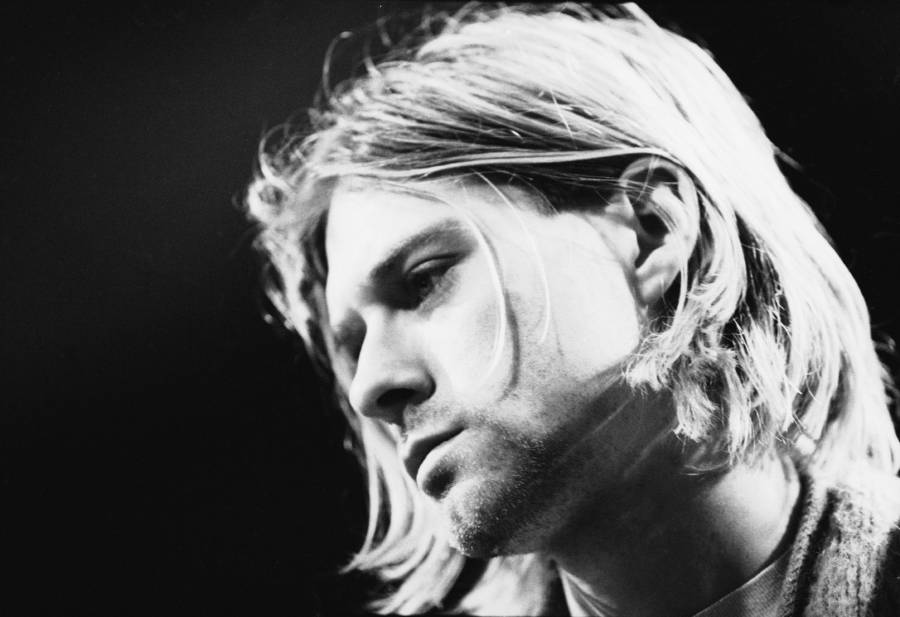
Frank Micelotta/Getty ImagesThe iconic singer and guitarist for grunge rockers Nirvana, Kurt Cobain died by suicide at 27 after shooting himself inside his Seattle home on April 5, 1994.
The 2015 documentary Soaked In Bleach proffers a highly disturbing alternative to the official narrative surrounding Cobain’s suicide. The film chronicles his last few days and is chiefly described through Tom Grant, the investigator Love had hired to find him.
Though Love issued a cease and desist letter to the film’s producers, she has yet to file a lawsuit. Conspiracy theorists use this decision of hers to bolster their theories. They interpret it as a wise move on her part to protect herself from divulging any salacious details about Kurt Cobain’s death under oath.
“Courtney Love’s uninformed accusations and efforts to discredit the film are totally off base,” the producers asserted. “Courtney Love and her lawyers clearly don’t like that the film presents a compelling case for re-opening the investigation into Kurt’s death.”
Cobain’s former lawyer, Rosemary Carroll, is also adamant that the official story is suspicious and she believes Kurt Cobain’s suicide note was forged.
“I don’t think he wrote it,” she said. “I feel the same way I felt when I read it. He didn’t write it.”
She never elaborated on this point, though it’s perhaps noteworthy that one of the few people with the most intimate knowledge of Cobain’s finances and legal hurdles feels so strongly about this.
Tom Grant had already been the subject of a similar documentary, Kurt & Courtney, in 1998, wherein he claimed Love only hired him to investigate so she wouldn’t be seen as a suspect. His theory is that Kurt Cobain was murdered in a conspiracy orchestrated by Love and that the case should be reopened.
Punk singer El Duce makes an appearance in the documentary, too, and he details the couple’s drug use. El Duce adds that Love offered him $50,000 to murder Cobain. He said he knew who eventually did murder Cobain, but that he’d “let the FBI catch him.”
Two days after that interview was filmed, El Duce was killed by a train.
Supporters of this theory believe then that Love wrote parts of Kurt Cobain’s suicide letter and that the initial paragraphs were intended as a break-up letter to Cobain’s band members.
Forensic linguist Carole Chaski, meanwhile, isn’t convinced of this conspiracy. She told the House Of Mystery Radio Show that her “results do not support the conspiracy theory that Courtney Love authored the bottom portion to make it look like a suicide note.”
Chaski had used computer software called SNARE (Suicide Note Assessment Review) to determine that Kurt Cobain’s suicide note was legitimate, though some have cast doubt on this method.
The Emotional Aftermath Of Cobain’s Suicide
Regardless of the veracity of Kurt Cobain’s suicide note, his loved ones still have to deal with the same pain. Nirvana drummer Dave Grohl, for one, said that his friend’s death was “probably the worst thing that has happened to me in my life.”
“I remember the day after that I woke up and I was heartbroken that he was gone,” Grohl said. “I just felt like, ‘Okay, so I get to wake up today and have another day and he doesn’t.'”
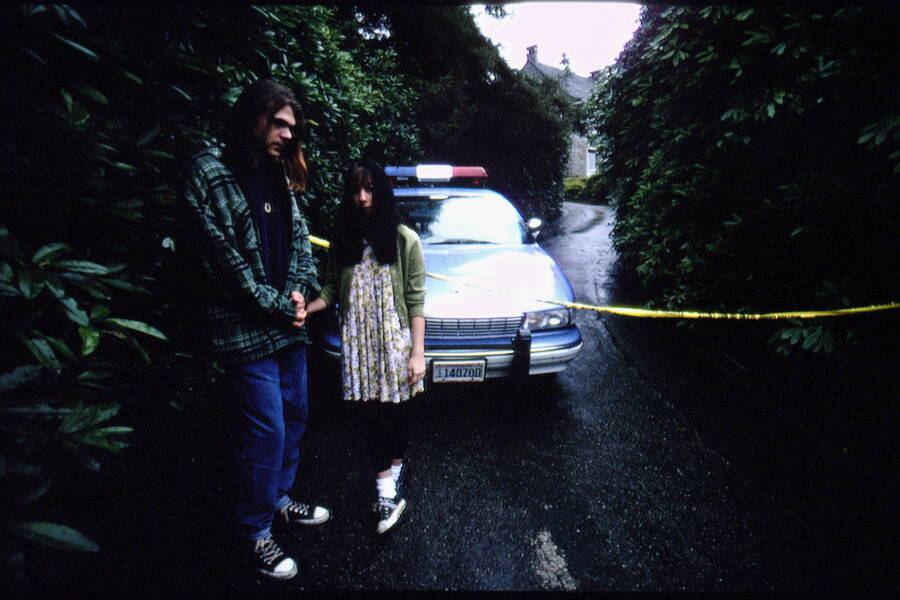
John van Hasselt/Sygma via Getty ImagesFans gather outside Kurt Cobain’s house soon after his suicide on April 5, 1994.
Thousands of fans felt similarly and so attended his public vigil in Seattle where Love read Kurt Cobain’s suicide note to all his adoring fans. The now-famous bits, like “it’s better to burn out than to fade away,” which was originally a Neil Young quote, and “I have a daughter who reminds me too much of myself,” were hard to hear between Love and the fans’ sobs.
Frances Bean Cobain wasn’t even two years old when her father died. In the last few decades, she has experienced her own share of drug use, navigating a small semblance of fame, and living beneath the ghost of her father.
According to NME, she’s become an outspoken supporter of anyone battling addiction and internal demons, connecting with them on social media and attempting to spread compassion. More notably, her frequent use of “peace, love, empathy” is directly tied to some of the most poignant words in Kurt Cobain’s suicide note.
“I want to reclaim the peace, love, empathy thing as something that’s meant for health and for compassion and for true peace, love, and empathy,” she said. “Yeah, the association comes from a super dark place. Referencing that is kind of screwed up but at the same time taking the power back his my way of dealing with it.”
Even decades after his death, Kurt Cobain’s suicide note still says a lot about who he was, why so many loved him, and the legacy he’s left behind.
After learning about Kurt Cobain’s suicide note, see some of the haunting photos from the scene of Cobain’s death. Then, read the tragic story of Evelyn McHale and the most “beautiful” suicide.
